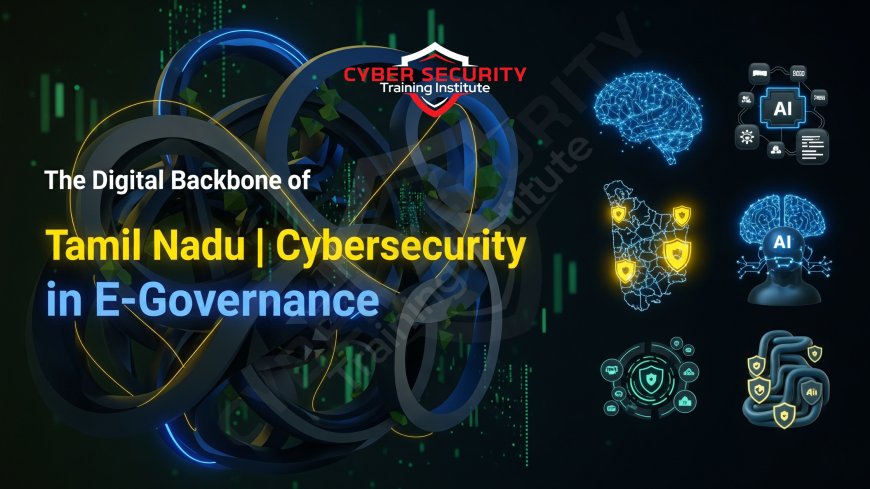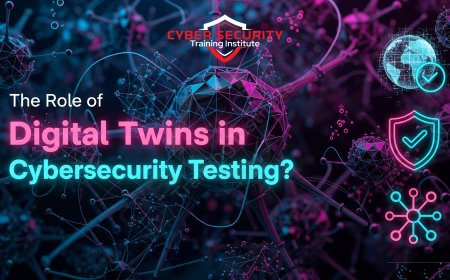The Digital Backbone of Tamil Nadu | Cybersecurity in E-Governance
In the heart of South India, Tamil Nadu is rapidly transforming into a digital powerhouse. With its ambitious e-governance initiatives, the state is making government services more accessible, efficient, and transparent for its citizens. From online land records to digital payment systems for public utilities, Tamil Nadu’s e-governance framework is revolutionizing how people interact with the government. But with great digital progress comes an equally great responsibility: ensuring the security of these systems. Cybersecurity is the invisible shield that protects this digital backbone, safeguarding sensitive data and maintaining public trust. In this blog, we explore how Tamil Nadu is strengthening its e-governance systems through robust cybersecurity measures, why it matters, and what challenges lie ahead.

Table of Contents
- Introduction to E-Governance in Tamil Nadu
- Why Cybersecurity Matters in E-Governance
- Tamil Nadu’s E-Governance Initiatives
- Common Cybersecurity Threats in E-Governance
- Cybersecurity Strategies in Tamil Nadu
- Challenges in Implementing Cybersecurity
- The Future of Cybersecurity in Tamil Nadu’s E-Governance
- Conclusion
- Frequently Asked Questions
Introduction to E-Governance in Tamil Nadu
E-governance refers to the use of digital technologies to deliver government services, streamline administrative processes, and enhance citizen participation. In Tamil Nadu, e-governance has been a game-changer. The state has launched initiatives like the Tamil Nadu e-Governance Agency (TNeGA), which oversees projects such as online certificate issuance, e-district services, and digital grievance redressal systems. These platforms allow citizens to access services like birth certificates, property documents, and utility bill payments from the comfort of their homes.
But as these services move online, they become targets for cybercriminals. Sensitive data, such as personal identification details or financial records, can be exploited if not properly protected. This is where cybersecurity steps in, ensuring that Tamil Nadu’s digital infrastructure remains secure and trustworthy.
Why Cybersecurity Matters in E-Governance
Cybersecurity is the practice of protecting systems, networks, and data from digital attacks, unauthorized access, or damage. In e-governance, cybersecurity is critical for several reasons:
- Protecting Citizen Data: E-governance platforms store sensitive information like Aadhaar numbers, bank details, and property records. A data breach could lead to identity theft or financial fraud.
- Maintaining Public Trust: If citizens lose confidence in the security of e-governance systems, they may hesitate to use digital services, undermining the state’s digital transformation goals.
- Preventing Financial Loss: Cyberattacks can disrupt government operations, leading to financial losses and delays in service delivery.
- Ensuring Continuity: Robust cybersecurity ensures that e-governance platforms remain operational even during cyber threats, minimizing downtime.
In Tamil Nadu, where millions rely on digital services, cybersecurity is not just a technical requirement—it’s a commitment to citizen welfare.
Tamil Nadu’s E-Governance Initiatives
Tamil Nadu has been a pioneer in e-governance, with several flagship programs driving digital transformation. Here’s a look at some key initiatives:
| Initiative | Description | Impact |
|---|---|---|
| TNeGA | Tamil Nadu e-Governance Agency oversees digital transformation projects across the state. | Coordinates e-governance projects, ensuring seamless service delivery. |
| e-District | Provides online access to certificates like birth, death, and income certificates. | Reduces paperwork and improves accessibility for rural citizens. |
| Arasu Cable | State-owned internet and cable services for affordable connectivity. | Enhances digital inclusion in underserved areas. |
| Tamil Nadu e-Sevai | A one-stop portal for accessing multiple government services. | Simplifies citizen-government interactions. |
These initiatives rely on secure digital infrastructure to function effectively, making cybersecurity a cornerstone of their success.
Common Cybersecurity Threats in E-Governance
As Tamil Nadu’s e-governance systems expand, they face a range of cyber threats. Understanding these threats is the first step toward building a secure digital ecosystem. Some common threats include:
- Phishing Attacks: Cybercriminals send fake emails or messages pretending to be from government agencies to trick users into sharing personal information.
- Malware: Malicious software can infect e-governance systems, stealing data or disrupting services.
- Data Breaches: Hackers may exploit vulnerabilities to access sensitive citizen data, such as Aadhaar or financial details.
- Denial-of-Service (DoS) Attacks: These attacks overload servers, making e-governance platforms temporarily unavailable.
- Insider Threats: Employees or contractors with access to systems may accidentally or intentionally compromise security.
Each of these threats poses significant risks, requiring proactive measures to protect Tamil Nadu’s e-governance infrastructure.
Cybersecurity Strategies in Tamil Nadu
Tamil Nadu has implemented several strategies to secure its e-governance systems. These efforts combine technology, policy, and public awareness to create a robust defense against cyber threats:
- Encryption: Sensitive data, such as citizen records, is encrypted to prevent unauthorized access. Encryption scrambles data into a format that can only be read with the correct key.
- Firewalls and Intrusion Detection Systems: These tools monitor network traffic and block suspicious activities, acting as a barrier between e-governance systems and potential attackers.
- Regular Security Audits: Tamil Nadu conducts periodic audits to identify and fix vulnerabilities in its e-governance platforms.
- Two-Factor Authentication (2FA): Many e-governance portals require users to verify their identity using a password and a secondary method, like a one-time code sent to their phone.
- Citizen Awareness Programs: The state runs campaigns to educate citizens about safe online practices, such as recognizing phishing emails and using strong passwords.
By combining these strategies, Tamil Nadu is building a secure digital environment that supports its e-governance goals.
Challenges in Implementing Cybersecurity
While Tamil Nadu has made significant strides in cybersecurity, several challenges remain:
- Limited Awareness: Many citizens, especially in rural areas, lack knowledge about cybersecurity best practices, making them vulnerable to scams.
- Resource Constraints: Implementing advanced cybersecurity measures requires significant funding and skilled personnel, which can strain state budgets.
- Evolving Threats: Cybercriminals constantly develop new techniques, requiring continuous updates to security systems.
- Legacy Systems: Older e-governance platforms may have outdated security features, making them harder to protect.
- Coordination Issues: Effective cybersecurity requires collaboration between multiple government departments, which can be challenging to coordinate.
Addressing these challenges requires a long-term commitment to innovation, education, and collaboration.
The Future of Cybersecurity in Tamil Nadu’s E-Governance
The future of e-governance in Tamil Nadu is bright, but it hinges on staying ahead of cyber threats. Emerging technologies like artificial intelligence (AI) and blockchain could play a significant role. AI can analyze vast amounts of data to detect suspicious activities in real-time, while blockchain can create secure, tamper-proof records for sensitive transactions. Tamil Nadu is also investing in training programs to build a skilled cybersecurity workforce, ensuring the state is prepared for future challenges.
Additionally, partnerships with private companies and academic institutions can drive innovation in cybersecurity. By fostering a culture of continuous improvement, Tamil Nadu can maintain its position as a leader in e-governance while keeping citizen data safe.
Conclusion
Tamil Nadu’s e-governance initiatives are transforming the way citizens interact with the government, making services more accessible and efficient. However, the success of these initiatives depends on robust cybersecurity measures. By protecting sensitive data, maintaining public trust, and ensuring system reliability, cybersecurity serves as the digital backbone of Tamil Nadu’s e-governance framework. While challenges like evolving threats and limited awareness persist, the state’s proactive strategies—such as encryption, regular audits, and citizen education—demonstrate a commitment to building a secure digital future. As Tamil Nadu continues to innovate, its focus on cybersecurity will ensure that its e-governance systems remain a model for others to follow.
Frequently Asked Questions
What is e-governance?
E-governance is the use of digital technologies to deliver government services, improve administrative efficiency, and enhance citizen participation.
Why is cybersecurity important in e-governance?
Cybersecurity protects sensitive citizen data, maintains public trust, prevents financial losses, and ensures the continuity of digital government services.
What is TNeGA?
TNeGA, or Tamil Nadu e-Governance Agency, is the state body responsible for overseeing and implementing e-governance projects across Tamil Nadu.
What are some examples of e-governance services in Tamil Nadu?
Examples include e-Sevai for accessing government services, e-District for certificate issuance, and Arasu Cable for affordable internet connectivity.
What is a phishing attack?
A phishing attack involves cybercriminals sending fake emails or messages pretending to be from legitimate sources to steal personal information.
How does Tamil Nadu protect its e-governance systems?
The state uses encryption, firewalls, intrusion detection systems, two-factor authentication, and regular security audits to secure its systems.
What is encryption?
Encryption is the process of scrambling data into a format that can only be read with a specific key, protecting it from unauthorized access.
What is two-factor authentication (2FA)?
2FA requires users to verify their identity with two methods, such as a password and a one-time code sent to their phone, for added security.
What are the common cyber threats to e-governance?
Common threats include phishing, malware, data breaches, denial-of-service attacks, and insider threats.
What is a denial-of-service (DoS) attack?
A DoS attack overloads a server with traffic, making e-governance platforms temporarily unavailable to users.
How does Tamil Nadu raise cybersecurity awareness?
The state runs campaigns to educate citizens about safe online practices, such as recognizing phishing emails and using strong passwords.
What are the challenges in implementing cybersecurity?
Challenges include limited citizen awareness, resource constraints, evolving threats, outdated systems, and coordination issues.
How can citizens protect themselves when using e-governance platforms?
Citizens should use strong passwords, enable 2FA, avoid suspicious links, and keep their devices updated with the latest security patches.
What role does AI play in cybersecurity?
AI can analyze data to detect suspicious activities in real-time, helping to prevent cyber threats before they cause harm.
What is blockchain, and how can it help e-governance?
Blockchain creates secure, tamper-proof records, which can be used to protect sensitive transactions in e-governance systems.
Are Tamil Nadu’s e-governance platforms safe to use?
Yes, the state employs robust cybersecurity measures, but users must also follow safe online practices to ensure their data remains secure.
How does Tamil Nadu handle insider threats?
The state uses access controls, monitoring systems, and employee training to minimize the risk of insider threats.
What is a security audit?
A security audit is a review of e-governance systems to identify and fix vulnerabilities, ensuring they remain secure.
How can Tamil Nadu improve its cybersecurity?
The state can invest in advanced technologies, train more cybersecurity professionals, and enhance public awareness campaigns.
What is the future of e-governance in Tamil Nadu?
The future involves leveraging AI, blockchain, and other technologies to create more secure and efficient e-governance systems.
What's Your Reaction?
 Like
0
Like
0
 Dislike
0
Dislike
0
 Love
0
Love
0
 Funny
0
Funny
0
 Angry
0
Angry
0
 Sad
0
Sad
0
 Wow
0
Wow
0
















